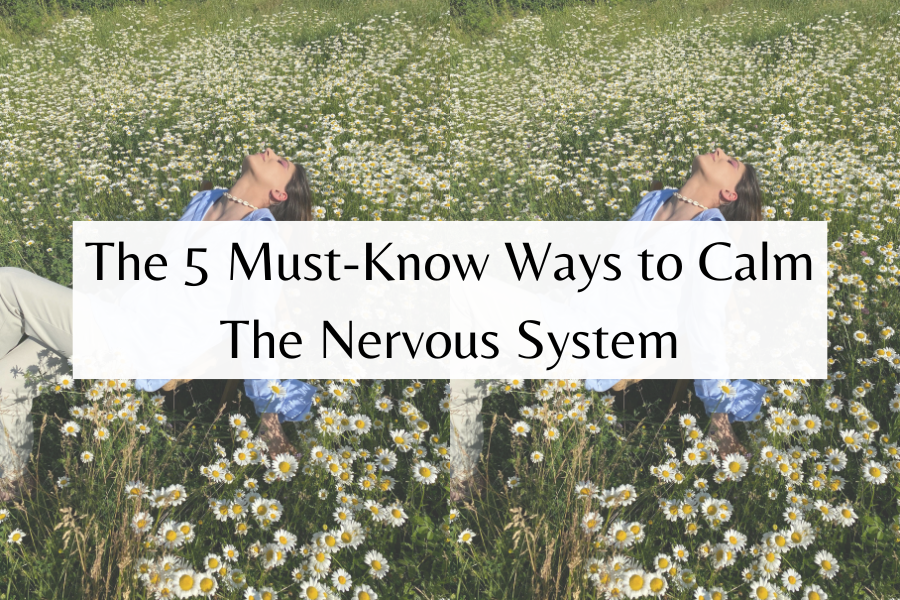Unlock the power within and begin your transformative journey of discovering how to calm the nervous system as a woman.
This post is for informational and educational purposes only. This post should not be taken as medical advice or used as a substitute for such. We do our best to present the best and most accurate information, however, we are not a licensed medical professional. All information on this Site is from personal experience or opinion, and we are not liable for risk and issues associated with using or acting upon the information on this Site. See Terms & Conditions for further information.

I can see it now, you’re a woman gracefully navigating her day-to-day, a true image of strength and resilience.
But beneath the surface, your nervous system like a tightly wound spring, is yearning for a release.
In today’s busy world, discovering the art of soothing your nervous system is not a luxury, but a necessity.
As women, we juggle so many different tasks every day and it can often become very overwhelming.
Our nervous system can take a hit and all of a sudden, we have become rundown and exhausted.
Learning how to regulate and calm your nervous system is so important because it can decrease levels of stress in your body and reduce related health problems.
This allows for a happier, healthier life.
This post is all about the 5 must-know ways to calm the nervous system.
1. Mindful Breathing To Calm Nervous System
The first way you can calm the nervous system is by practicing mindful breathing.
Mindful breathing activates the parasympathetic nervous system which then sends a signal to the brain telling your body it’s safe and you don’t need to use your fight, flight, or freeze response.
These are a few breathing techniques you can practice.
1. Deep Breathing
The first is deep breathing. This is a fairly simple one as you’ll begin by inhaling, filling your lungs completely, holding for a count of 3, and then exhaling slowly.
Repeat at least 5 times or as many times as you need to feel the stress begin to melt away.
2. Alternate Nostril Breathing
The next is alternate nostril breathing. For this one, start by covering your left nostril with your left-hand thumb. Inhale, hold for a second, and, then exhale.
Now uncover your left nostril and using your index finger cover your right nostril, inhale, hold, and, exhale. Repeat a few times on each side.
3. Abdomen Breathing
The last one is abdomen breathing. For this, you can either sit or lay down, whichever is more comfortable.
Put one hand over your chest and the other over your abdomen. Take a big breath in focusing on filling up the air in the bottom of the lunges first.
You should feel the hand on your abdomen move out first and then the hand over your chest.
With each technique, focus on controlled, slow, deep breaths. This is what will active your parasympathetic nervous system and bring that feeling of calm.

2. Practice Meditation & Mindfulness To Reduce Stress
The next way you can calm the nervous system is by implementing meditation and mindfulness practices into your daily routine.
Mediation is a great practice to help calm your nervous system because it triggers the body’s relaxation response. When you meditate you may focus on clearing away the overload of information and thoughts that build up and contribute to your stress.
Some people are really great at clearing their minds, but other people need a different strategy.
If you find it difficult to simply sit and clear your mind, try focused meditation.
This is where you focus on a single point, like your breath, a sound, or a visual. Many people like to use a candle as a visual.
There are many other benefits meditation provides besides calming your nervous system.
It also helps you build ways to manage your stress, makes you more self-aware of your thoughts and actions, helps you focus on the present, and reduces negative feelings.
It can help you become more patient, lower your blood pressure and heart rate, and can improve your sleep quality.
You can practice mindfulness throughout your day by integrating mindful eating and taking mindful walks.
When eating try to chew slowly and savour each bite you take.
Notice the textures, flavours, and everything about it. Simply slow down and focus on eating your meal instead of rushing through it.
Another thing you can do is go on mindful walks. Take a walk outside and focus on everything you see and hear.
Maybe you see the trees blowing in the wind and hear the birds chirping around you. Focusing on the beauty nature provides will help you relax and lower your stress levels.
3. Get Regular Exercise & Movement
Moving your body regularly and getting exercise can be a very beneficial act for helping to calm the nervous system and reduce stress.
When you get physical activity, it helps to reduce levels of the body’s stress hormones adrenaline and cortisol.
It also stimulates the production of endorphins, the feel-good chemical in our brains. These are the body’s natural painkillers and mood boosters.
There are various ways you can get physical activity to help calm the nervous system.
Some great things to try are yoga, pilates, walking, or even dancing to your favourite song!
I know I always feel a lot better after putting on some good music and letting my body flow.
You can also lift weights to help reduce stress but sometimes people can feel a little more tense after weightlifting, or being in the gym environment.
So, if your goal is to calm yourself, I would suggest trying a slower form of movement first. But if you enjoy weight training and the benefits it provides you then do what feels best for you!
One of the hardest things about exercise is turning it into a consistent routine. A great way to increase your likelihood of exercising is to habit-stack it with other activities you normally do.
For example, you could get some physical activity in every day on your lunch break, then follow that by eating a nutritious lunch.
Or if you prefer morning exercise then make it a routine to wake up, grab a small bite to eat, have your tea or coffee and then workout directly afterward.
It’s all about making it a lifestyle, making it sustainable.
So, find the movement you enjoy and stick with it! Even a little movement like a walk is better than none.

4. Nourishing Diet & Hydration To Calm Nervous System
The fourth way to help calm the nervous system is to make sure you’re eating a nourishing diet and keeping hydrated.
When your nervous system is overwhelmed and you’re stressed this triggers your drive for comfort food.
I think most people have experienced this in their life. Whether it’s been a bad day at work or your to-do list at home is pages long, sometimes it causes us to seek comfort.
And a lot of time we seek comfort in our favourite foods.
Unfortunately, most of the time the foods we crave when we’re seeking comfort are high in sugar, salt, and fat.
They release that immediate feel-good feeling, but afterward, they leave us feeling bad, usually with an upset tummy if we overeat, which is easy to do with foods high in sugar, salt, and fat.
There are certain nutrients that have a protective effect on the nervous system. Amino acids, vitamins C, E & D, and B group vitamins are a few.
Some foods to eat to ensure you’re getting these nutrients are dark leafy greens, berries, citrus fruits, avocados, zucchini, sweet potatoes, and quinoa.
Start focusing on eating a wide range of whole foods and limiting processed foods that way you’ll increase your nutrient intake and help your brain function.
Hydration is next. When you’re dehydrated your body switches to the sympathetic nervous system, fight or flight mode. Causing you to feel stressed instead of relaxed.
By making sure you’re drinking water throughout your day you can keep hydrated and remind your body it can relax and stay in the parasympathetic nervous system.
5. Relaxation & Self-Care To Calm The Nerves
The last way to calm the nervous system is with relaxation and self-care practices.
Some great relaxation techniques you can try are aromatherapy or taking warm baths.
Studies show that aromatherapy can help relieve stress and anxiety. Using essential oils like lavender, bergamot, lemon, and geranium can stimulate the brain to make serotonin and dopamine. The feel-good chemicals we love!
There are many other health benefits of aromatherapy as well.
You can also help calm the nervous system by taking warm baths. Most of us love a nice warm soothing bath, and the good thing is now you have the excuse to take more.
Taking a warm bath can activate the parasympathetic nervous system which puts us in a relaxed state.
So grab your favourite bath bubbles and a candle and enjoy a bath tonight.
Other self-care practices can help promote relaxation also, such as reading, journaling, and spending time in nature. All of these things help to activate that parasympathetic nervous system and create a calm feeling.
It’s important to prioritize these self-care practices as women and learn to calm the nervous system.
Make sure to also start implementing setting boundaries and saying no when you need some downtime to recharge.
It’s important to listen to your body and take it slow when you need to.
Women need more rest and time to recharge compared to men so make sure you give it to yourself.

Why Nervous System Regulation Is Important
When your sympathetic nervous system is active your body is sending more oxygen to your arms and legs to be ready to fight, flight or freeze if the situation calls for it.
As a result, there is less oxygen is moving to your brain.
All these practices are aimed at switching your body into the parasympathetic nervous system so that your body sends more oxygen to your brain instead of your limbs.
This keeps you in a calm and relaxed state letting your body know it’s safe and can relax.
Negative Effects of Too Much Stress
Stress in your life is inevitable. And having short-term stress in your life can actually boost the immune system. It’s when you have too much chronic stress that it can lead to various health problems.
When you’re over-stressed you may experience headaches or migraines, trouble sleeping, depression symptoms, anxiety, high blood pressure, weight gain, or digestive issues.
Prioritizing self-care practices and practicing calming the nervous system is how you will reduce stress and sustain an overall healthier lifestyle.

There are many ways to calm the nervous system and now you have them all.
Even if you can’t incorporate them all, start with 1 or 2 and see how you feel. You can also change up which nervous system relaxation technique you use each time to see which ones you prefer.
It comes down to living more mindfully, practicing mindful breathing, incorporating daily movement and meditation, eating a nourishing diet, and prioritizing self-care.
Whenever you are feeling overwhelmed or stressed out try one of the practices above.
It’s important to think of our health as a whole and calming the nervous system is no different.
We need to create a lifestyle where our health is a priority, and we practice self-care to make sure we are honouring our minds and bodies.
Now together let’s take a big deep breath in, hold for 1,2,3, and exhale slowly.
It’s time we learn how to regulate our nervous system and take our energy back.





[…] This practice of disconnecting from technology, even for a couple of hours can help reduce your stress and create more inner peace. For other tips on reducing stress and calming your nervous system check this post out. […]